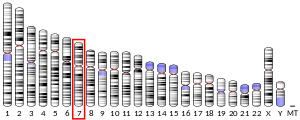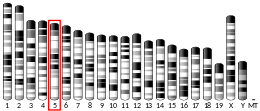Huntingtin-interacting protein 1
Huntingtin-interacting protein 1 also known as HIP-1 is a protein that in humans is encoded by the HIP1 gene.
Hip-1 is a protein that interacts with the huntingtin protein. It is known to contain a domain homologous to the death effector domains (DED) found on proteins involved in apoptosis. It is believed that accumulation of high levels of the free form of this protein (free as in dissociated from the huntingtin and free to bind other key protein(s)) in the cell is one of the mechanisms by which neuron cell death is caused in Huntington's disease (via the caspase-3 route). The role of Hip-1 in caspase mediated cell death remains unclear.
Discovery
Huntingtin interacting protein 1 (HIP1) was first identified by Wanker et al. in 1997.[5]
Function
HIP1 was found to bind to Htt in an N-terminal dependent manner, and co-localise with Htt in the CNS although the nature of this interaction with respect to muHtt was not identified. It has since been found that the CAG expansion seen with muHtt results in decreased binding affinity for HIP1, thus causing disruption of HIP1’s usual function, and also an increase in free HIP1.[6] It is likely that this decreased affinity plays a role in mediating HD pathogenesis, due to loss of cytoskeletal integrity and induction of apoptosis. HIP1’s pro apoptotic effect may involve activation of caspase-8 and a novel HIP1 protein interactor HIPPI.[7] HIP1’s non-pathological activity includes clathrin assembly via interaction with clathrin light chains.[8] HIP1 is the human homologue of Sla2p, a membrane protein in the periphery.[9] Sla2p is an actin-binding protein involved in endocytosis, thus indicating HIP1 in this role. Further details suggesting an important role for Hip-1 in endocytosis comes from binding studies looking at Hip-1 binding to actin. Actin binding by Hip-1 is altered depending on whether clathrin is also bound to Hip-1.
Clinical significance
HIP1 has also been found to be overexpressed in some cancers including a subset of colorectal and prostate cancers.[10] This is of specific interest because prostate cancer disease progression involves altered transcription/expression of the androgen receptor (AR).[11] The AR is a nuclear hormone receptor transcription factor that contains polyglutamine repeats. In 2005 Mills and colleagues showed that HIP1 is able to regulate transcription of hormone receptors via the androgen response element (ARE) and also alters the rate of degradation of the AR.[12] It is likely that HIP1 is also able to regulate, or at least interact with proteins that also possess the ARE.
References
- GRCh38: Ensembl release 89: ENSG00000127946 - Ensembl, May 2017
- GRCm38: Ensembl release 89: ENSMUSG00000039959 - Ensembl, May 2017
- "Human PubMed Reference:". National Center for Biotechnology Information, U.S. National Library of Medicine.
- "Mouse PubMed Reference:". National Center for Biotechnology Information, U.S. National Library of Medicine.
- Wanker EE, Rovira C, Scherzinger E, Hasenbank R, Wälter S, Tait D, Colicelli J, Lehrach H (Mar 1997). "HIP-I: a huntingtin interacting protein isolated by the yeast two-hybrid system". Human Molecular Genetics. 6 (3): 487–95. doi:10.1093/hmg/6.3.487. PMID 9147654.
- Hackam AS, Yassa AS, Singaraja R, Metzler M, Gutekunst CA, Gan L, Warby S, Wellington CL, Vaillancourt J, Chen N, Gervais FG, Raymond L, Nicholson DW, Hayden MR (Dec 2000). "Huntingtin interacting protein 1 induces apoptosis via a novel caspase-dependent death effector domain". The Journal of Biological Chemistry. 275 (52): 41299–308. doi:10.1074/jbc.M008408200. PMID 11007801.
- Gervais FG, Singaraja R, Xanthoudakis S, Gutekunst CA, Leavitt BR, Metzler M, Hackam AS, Tam J, Vaillancourt JP, Houtzager V, Rasper DM, Roy S, Hayden MR, Nicholson DW (Feb 2002). "Recruitment and activation of caspase-8 by the Huntingtin-interacting protein Hip-1 and a novel partner Hippi". Nature Cell Biology. 4 (2): 95–105. doi:10.1038/ncb735. PMID 11788820.
- Legendre-Guillemin V, Metzler M, Lemaire JF, Philie J, Gan L, Hayden MR, McPherson PS (Feb 2005). "Huntingtin interacting protein 1 (HIP1) regulates clathrin assembly through direct binding to the regulatory region of the clathrin light chain". The Journal of Biological Chemistry. 280 (7): 6101–8. doi:10.1074/jbc.M408430200. PMID 15533941.
- Holzmann C, Schmidt T, Thiel G, Epplen JT, Riess O (Aug 2001). "Functional characterization of the human Huntington's disease gene promoter". Brain Research. Molecular Brain Research. 92 (1–2): 85–97. doi:10.1016/s0169-328x(01)00149-8. PMID 11483245.
- Rao DS, Hyun TS, Kumar PD, Mizukami IF, Rubin MA, Lucas PC, Sanda MG, Ross TS (Aug 2002). "Huntingtin-interacting protein 1 is overexpressed in prostate and colon cancer and is critical for cellular survival". The Journal of Clinical Investigation. 110 (3): 351–60. doi:10.1172/JCI15529. PMC 151092. PMID 12163454.
- Chen CD, Welsbie DS, Tran C, Baek SH, Chen R, Vessella R, Rosenfeld MG, Sawyers CL (Jan 2004). "Molecular determinants of resistance to antiandrogen therapy". Nature Medicine. 10 (1): 33–9. doi:10.1038/nm972. PMID 14702632.
- Mills IG, Gaughan L, Robson C, Ross T, McCracken S, Kelly J, Neal DE (Jul 2005). "Huntingtin interacting protein 1 modulates the transcriptional activity of nuclear hormone receptors". The Journal of Cell Biology. 170 (2): 191–200. doi:10.1083/jcb.200503106. PMC 2171420. PMID 16027218.



